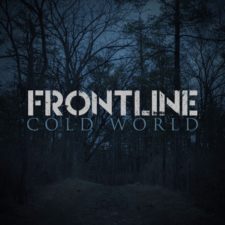
All That Remains. Center: Phil Labonte
Massachusetts metallers, All That Remains, have always been a band willing to push the musical boundaries of their genre. Fronted by the notorious and outspoken vocalist Phil Labonte, the quintet have explored a wide array of sounds in their 15 years together, with complete disregard for those who have doubted them.
Although the band’s ties are very much associated with the pioneers of metalcore at the beginning of the century, it is reasonable to say Labonte and company have been the recipients of some unfair criticism over the years. Despite this, All That Remains are back with some of their strongest and most genuine material to date in the shape of their eighth studio album, Madness…
The album starts with the heavy, blistering whirlwind of “Safe House,” which sees the band channel their melodic death metal routes, with Labonte’s distorted vocals growling the line, “Welcome to my safe house, do you feel safe now?” after an intense and rapid opening. If this track’s intention was to immediately silence their critics, the aggression and ferocity of the song alone is enough to intimidate the hardiest of individuals.
The opener makes way for the frankly stunning title-track “Madness,” which not only delivers a huge anthemic sounding chorus but showcases the band’s musical capabilities reminiscent of their biggest hits like “This Calling,” responsible for putting All That Remains on the map in the first place. This is testament of Grammy award-winning producer Howard Benson (Papa Roach, Halestorm), who has clearly managed to drive All That Remains to sounding their best in years.
Typical of Phil Labonte’s writing inspiration and style, Madness isn’t afraid to challenge the listener to think about provocative themes and the current political climate. “I don’t mind if I piss off if it gets them to think about things. People know that I have strong opinions, and I disagree with things. That’s my whole deal.” While there are those that reject the group’s music due to some of the vocalist’s controversial views, tracks like the genuinely beautiful “Back To You” demonstrate a level of intimacy you can’t help but admire.
The same can be said for one of the album’s highlights “River City,” written about Labonte’s then-wife serving in the Marines overseas. “If someone dies, they shut off communications until they can notify the families of the people that die. So we’d be talking and she would say, ‘Hey, we’re going to River City and hang up, and I wouldn’t talk to her for three or four days, and I wouldn’t know what happened. The base is getting mortared. She might have taken a round or died. Being on the other end of that is agonizing.”
While some of the themes All That Remains touch on with Madness may show a more emotional side to the vocalist’s personal life, the quintet don’t compromise this direction for their ability to churn out quality modern-metal anthems. “Louder,” “Nothing I Can Do,” and “Halo” all satisfy a demand for an injection of pace and power. However, the album does take a slight dip in form with the inclusion of the mild “If I’m Honest” and fairly bland “Never Sorry,” perhaps preventing the album from reaching its full potential.
Whereas the band has been widely criticized for straying away from their heavy roots to more accessible and even electronic influences on a number of back-catalogue studio albums, Madness is evidence of a band engaging and embracing every aspect of their career. One of its strongest traits is its efficiency to deliver something for fans of each of their past albums whether that be the crushing heaviness of “Safe House” to the impressive celebratory closer, a cover of Garth Brook’s “The Thunder Rolls.” Love them or hate them, All That Remains are back doing what they do best, creating quality, underrated metal.

Connect with All That Remains (click icons):
Review by Tom Vaughan, RockRevolt Journalist
Tags: "MADNESS", album review, All That Remains, Phil Labonte, RockRevolt, RockRevolt Magazine


















 Share On Facebook
Share On Facebook Tweet It
Tweet It






























